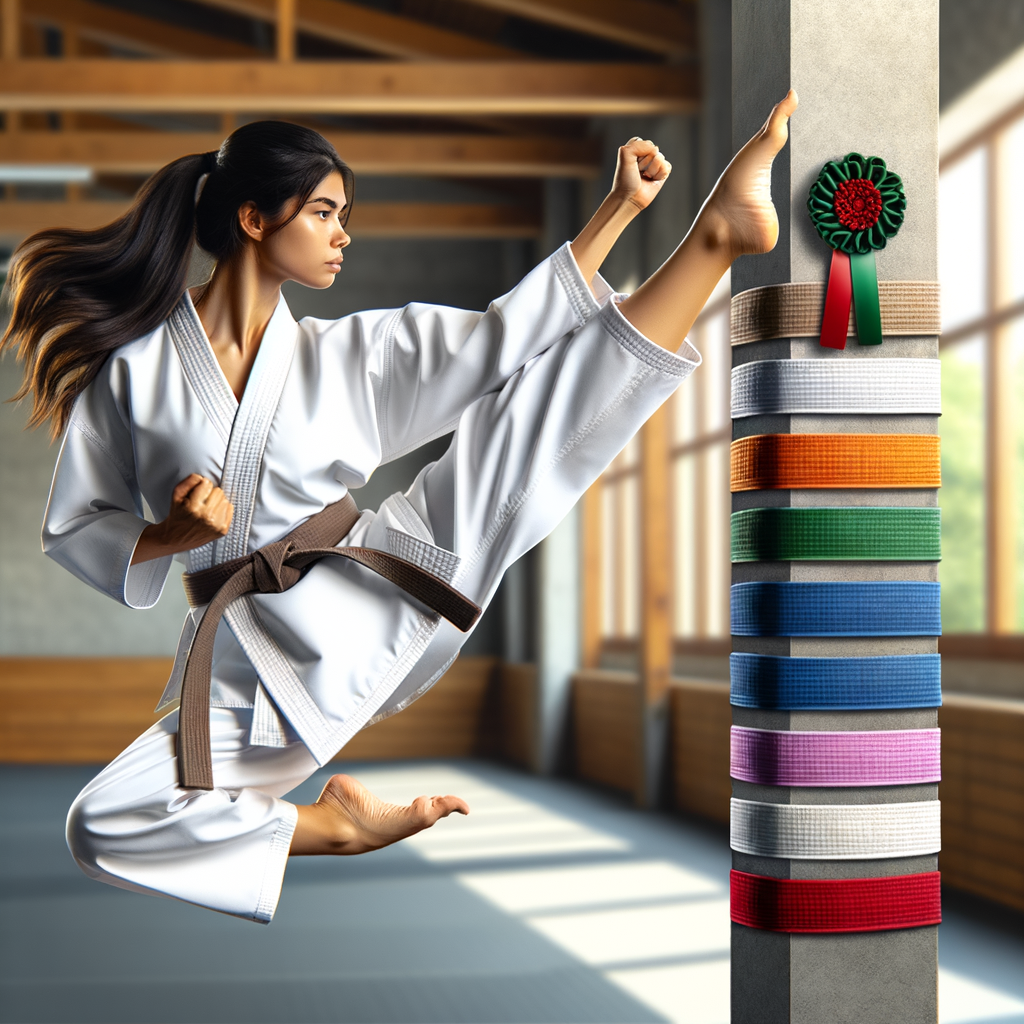
Introduction to Karate and Personal Milestones
Welcome to our comprehensive guide on Karate and personal milestones. This guide aims to provide you with a clear understanding of the concept of Karate and how to define personal milestones in your Karate journey.
- Understanding the concept of Karate
- Defining personal milestones in Karate
Karate is a martial art that originated in Okinawa, Japan. It is a discipline that combines mental and physical training. The word ‘Karate’ translates to ’empty hand’, signifying that its practitioners, known as Karatekas, learn to defend themselves without weapons. Karate focuses on using punches, kicks, knee strikes, elbow strikes, and open-hand techniques like knife-hands and ridge-hands. It also emphasizes proper breathing and concentration.
Personal milestones in Karate are individual goals that you set for yourself as you progress in your training. These milestones can be as simple as mastering a new technique, earning a new belt, or participating in a tournament. Setting personal milestones is an effective way to track your progress, stay motivated, and achieve your overall Karate goals. Remember, every Karateka’s journey is unique, so your milestones should be personal and meaningful to you.
Throughout this guide, we will delve deeper into setting personal milestones in Karate, achieving these goals, and presenting case studies of individuals who have achieved personal milestones through Karate. We hope this guide will inspire and guide you in your Karate journey.
Setting Personal Milestones in Karate
In the journey of mastering karate, setting personal milestones is a crucial step. It helps you track your progress and keep you motivated. Let’s explore some effective goal-setting techniques in karate.
Goal Setting Techniques in Karate
Goal setting in karate involves three main steps. These steps are designed to help you identify, set, and achieve your karate training goals.
- Identifying Your Karate Training Goals
- Setting Realistic and Achievable Goals
- Creating a Timeline for Your Milestones
Firstly, you need to identify what you want to achieve in your karate training. It could be anything from learning a new technique, improving your fitness level, or advancing to a higher belt rank. Remember, your goal should be something that motivates you to push beyond your comfort zone.
Once you have identified your goals, the next step is to ensure they are realistic and achievable. For instance, if you are a beginner, setting a goal to win a national karate championship within a year might be unrealistic. Instead, a more achievable goal could be to advance to the next belt rank or master a specific kata within a certain timeframe.
The final step in goal setting is to create a timeline for your milestones. This involves breaking down your overall goal into smaller, manageable milestones and setting a timeline for each. For example, if your goal is to advance to the next belt rank within a year, you might set milestones for mastering specific techniques or katas every month.
Setting personal milestones in karate is not just about achieving your goals. It’s also about enjoying the journey, learning new skills, and growing as a person. So, set your goals, work hard, and most importantly, enjoy your karate journey!
Examples of Personal Milestones in Karate
In the journey of Karate, there are several personal milestones that one can aim to achieve. These milestones not only reflect your progress but also motivate you to push your limits. Let’s explore some of these milestones:
- Achieving a new belt rank: In Karate, the color of your belt signifies your skill level. Starting from a white belt, which signifies a beginner, you can progress to a yellow, orange, green, blue, purple, brown, and finally a black belt, which represents mastery. Each belt rank is a significant milestone, reflecting your growth and dedication to the art of Karate.
- Mastering a complex kata: Kata is a series of defensive and offensive moves against imaginary opponents. It is a fundamental aspect of Karate training. Mastering a complex kata is a significant milestone as it requires precision, balance, and coordination. It demonstrates your understanding of Karate techniques and your ability to execute them flawlessly.
- Winning a tournament: Participating in a Karate tournament is a great way to test your skills against other practitioners. Winning a tournament is a major milestone that showcases your proficiency in Karate. It is a testament to your hard work, discipline, and resilience.
Remember, every milestone achieved in Karate is a result of consistent practice, discipline, and determination. It’s not about how quickly you reach these milestones, but the journey and the lessons you learn along the way.
Achieving Goals in Karate
One of the most rewarding aspects of Karate is the personal development it fosters. This martial art is not just about physical strength, but also about building character and improving personal skills.
Personal Development through Karate
There are several ways in which Karate contributes to personal development. Let’s explore some of them:
- How Karate fosters discipline and focus: Karate is a martial art that requires a high level of discipline and focus. The training involves repetitive exercises that help to improve concentration. The discipline learned in Karate can also be applied to other areas of life, such as school or work.
- Building confidence through Karate training: Karate training involves overcoming challenges and pushing personal boundaries. This process helps to build confidence. As you progress through the ranks and achieve new belts, you will gain a sense of accomplishment and self-esteem.
- Improving physical fitness and agility: Karate is a great way to improve physical fitness. The training involves a range of movements that help to improve strength, flexibility, and coordination. Regular training can also help to improve cardiovascular health.
In conclusion, Karate is not just a sport or a hobby. It is a journey of personal development that can help you to achieve your goals and become a better person.
Martial Arts Goal Setting
When it comes to achieving your goals in Karate, setting clear and measurable objectives is crucial. Here are three effective strategies to help you stay on track and reach your milestones.
- Using Visualization Techniques
Visualization is a powerful tool used by many successful martial artists. By picturing yourself executing a perfect high kick or breaking a board, you can mentally prepare for the real thing. This technique not only helps you improve your physical skills but also boosts your confidence.
- Tracking Progress and Celebrating Small Wins
Keeping track of your progress is essential in martial arts training. Whether it’s mastering a new move or improving your stamina, every small win is a step towards your goal. Celebrating these achievements can motivate you to keep pushing forward. Remember, progress is not always linear, but every effort counts.
- Staying Motivated and Committed
Motivation and commitment are key to achieving your karate goals. It’s important to stay focused and dedicated, even when the training gets tough. Remember why you started and what you hope to achieve. This will help you stay committed and overcome any obstacles that come your way.
In conclusion, setting goals in martial arts involves more than just physical training. It requires mental strength, dedication, and a positive mindset. By using visualization techniques, tracking your progress, and staying motivated, you can achieve your karate goals and reach new heights in your training.
| Goal Setting Strategies | Benefits |
|---|---|
| Using Visualization Techniques | Improves physical skills and boosts confidence |
| Tracking Progress and Celebrating Small Wins | Keeps you motivated and acknowledges your efforts |
| Staying Motivated and Committed | Helps overcome obstacles and achieve goals |
Case Studies: Achieving Personal Milestones through Karate
Let’s delve into some real-life examples of individuals who have achieved significant personal milestones through karate. These case studies will provide a clearer picture of the potential benefits and achievements that can be gained from this martial art.
- Case Study 1: From beginner to black belt
- Case Study 2: Winning a national championship
- Case Study 3: Overcoming physical limitations
Meet John, a 35-year-old software engineer who had never engaged in any form of martial arts before. He started karate as a hobby, but it quickly became a passion. After five years of consistent training, he achieved his black belt, a significant milestone that symbolizes mastery in karate. This achievement not only boosted his self-confidence but also improved his focus and discipline, which positively impacted his professional life.
Next, we have Lisa, a high school student who had been practicing karate since she was eight. Her dedication and hard work paid off when she won the national karate championship at the age of 16. This achievement was a testament to her discipline, dedication, and the physical and mental strength she had developed through years of karate training. Winning the championship was a personal milestone that instilled in her a strong belief in her abilities and potential.
Finally, let’s look at the inspiring story of David, a man born with a physical disability. Despite his limitations, David took up karate and, with determination and perseverance, he was able to overcome many of his physical challenges. Karate training improved his mobility, strength, and coordination, which significantly enhanced his quality of life. His story is a powerful example of how karate can help individuals overcome personal and physical obstacles to achieve their milestones.
These case studies highlight the transformative power of karate. Whether it’s achieving a black belt, winning a championship, or overcoming physical limitations, karate can help individuals reach personal milestones and experience significant personal growth.
Conclusion: Karate Training and Personal Goals
In this article, we’ve journeyed through the world of karate, exploring how personal milestones play a crucial role in mastering this martial art. Now, let’s revisit the importance of setting personal goals and summarize the key takeaways on achieving them in karate.
- Revisiting the importance of setting personal milestones in Karate
Setting personal milestones in karate is not just about achieving physical prowess. It’s about personal growth, discipline, and resilience. Remember the case studies we discussed? Each individual set personal milestones that were unique to their journey and capabilities. These milestones served as stepping stones, guiding them towards their ultimate goal.
Whether it’s mastering a new kata, improving flexibility, or participating in a tournament, each milestone is a testament to your progress. They keep you motivated, help you track your progress, and provide a sense of accomplishment. In essence, personal milestones are the heart and soul of your karate journey.
- Key takeaways on achieving goals in Karate
Achieving goals in karate is a journey that requires patience, dedication, and hard work. Here are the key takeaways:
- Consistency is key: Regular practice is essential to improve your skills and move closer to your goals.
- Patience pays off: Karate is not about instant gratification. It takes time to master techniques and progress through the ranks.
- Resilience is crucial: There will be setbacks and challenges. Your ability to bounce back and keep going is what will ultimately lead you to success.
- Learning is a continuous process: Karate is a lifelong journey of learning. There’s always something new to learn, a technique to improve, or a challenge to overcome.
In conclusion, setting personal milestones and working towards achieving them is an integral part of karate training. It’s a journey of self-discovery, personal growth, and continuous learning. So, set your goals, stay committed, and embark on your unique karate journey. Remember, the journey is just as important as the destination.






